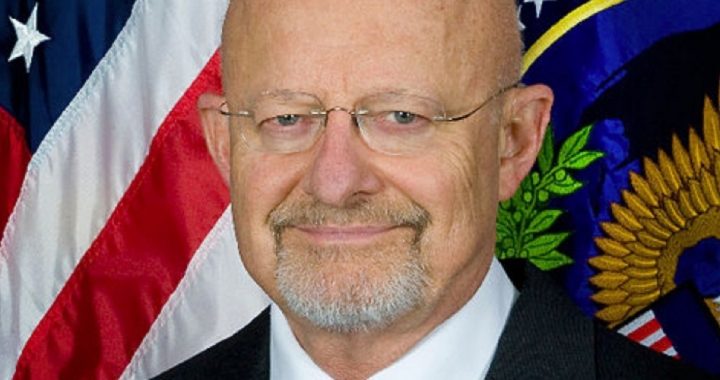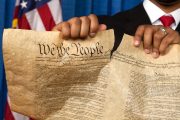
A large group of mostly Democratic U.S. senators penned a letter to National Intelligence Director James Clapper (shown) asking if the NSA had created a national gun registry by keeping all electronic business transactions in a permanent database. And the NSA just might have done this, contrary to existing law.
The 26 senators stated in the June 27 letter penned by Ron Wyden’s office:
We are troubled by the possibility of this bulk collection authority being applied to other categories of records. The PATRIOT Act’s business records authority is very broad in its scope. It can be used to collect information on credit card purchases, pharmacy records, library records, firearm sales records, financial information, and a range of other sensitive subjects. And the bulk collection authority could potentially be used to supersede bans on maintaining gun owner databases, or laws protecting the privacy of medical records, financial records, and records of book and movie purchases.
Additionally, the letter sought to get confirmation of details regarding dubious NSA claims that surveillance helped thwart a number of terrorist attacks on the United States:
We have now heard about a few cases in which these bulk phone records provided some information that was relevant to investigators, but we would like a full explanation of whether or not the records that were actually useful could have been obtained directly from the appropriate phone companies in an equally expeditious manner using either a regular court order or an emergency authorization.
Wyden’s letter also asked several questions of Clapper about the origins of the program and how sweeping the data-mining of the American public is under the NSA’s programs.
It’s hard to say if Wyden can reasonably expect an honest reply from Clapper. Wyden is a member of the Senate Select Committee on Intelligence, and was the victim of Clapper’s perjury before the committee on March 12, 2013, where Clapper flatly denied the NSA was data-mining the American public:
Sen. Wyden: What I wanted to see is if you could give me a yes or no answer to the question, does the NSA collect any type of data at all on millions or hundreds of millions of Americans?”
Director of National Intelligence James Clapper: “No, sir.”
Wyden: “It does not?”
Clapper: “Not wittingly. There are cases where they could inadvertently perhaps collect, but not wittingly.”
Wyden: “Thank you. I’ll have additional questions to give you in writing on that point, but I thank you for the answer.”
The revelations by former NSA whistleblower Edward Snowden revealed Clapper’s statement to be a boldfaced lie. Clapper later engaged in damage control on his lie by calling his response to Wyden the “least untruthful manner by saying no” in a June 9 interview with Andrea Mitchell of NBC News.
Of course, Clapper had been under oath to tell the truth — the whole truth — to senators, not to tell the “least untruthful” lie. Clapper’s admission he had lied under oath prompted some congressmen to call for his resignation. Congressman Justin Amash (R-Mich.) was one of the first. “Perjury is a serious crime,” Amash tweeted, adding, “Mr. Clapper should resign immediately.” The chairman of the Republican Liberty Caucus continued: “It now appears clear that the director of national intelligence, James Clapper, lied under oath to Congress and the American people.” Senator Rand Paul (R-Ky.) also claimed Clapper “lied.”
Amash noted in a subsequent tweet that ordinary Americans would be prosecuted for lying to Congress. “*You* would be sent to prison, but DNI Clapper just has to write a nice apology note when he lies under oath.” Indeed, Congress prosecuted baseball great Roger Clemens for allegedly lying about steroid use under oath in a congressional hearing. (Clemens was eventually acquitted by a jury on all six counts of perjury.) Of course, steroid use among professional baseball players is a far less serious public issue than spying on all Americans without a warrant and ignoring the unequivocal requirement for a warrant and probable cause under the Fourth Amendment to the U.S. Constitution.
The collection of a wide array of data on innocent American people has led to questions about how government will use — or misuse — the information. Clearly, the Edward Snowden revelations demonstrate that government agencies, such as the NSA, with access to such information cannot keep it from the public indefinitely. Indeed, even CIA Director John Brennan has been unable to enforce secrecy at the Central Intelligence Agency. Brennan wrote a memorandum distributed to agency personnel asking staff to “reinforce our corporate culture of secrecy,” in recent weeks. But the memo itself was leaked to the Associated Press.
Clearly, there’s ample reason for even the innocent to fear from extra-constitutional, warrantless surveillance programs, both from official misuse along the lines of the IRS scandal, as well as unauthorized misuse in the form of rogue intelligence agents who take the agency’s information for personal gain or revenge against perceived rivals.



